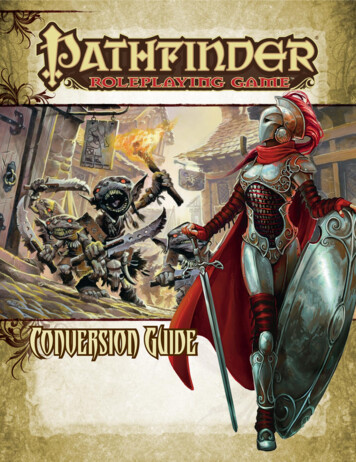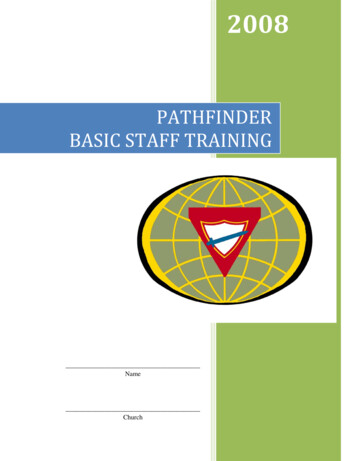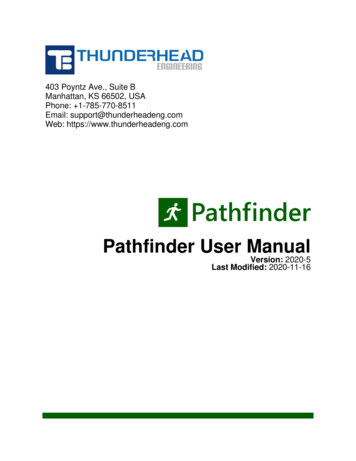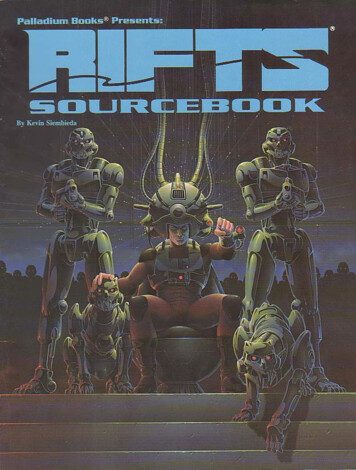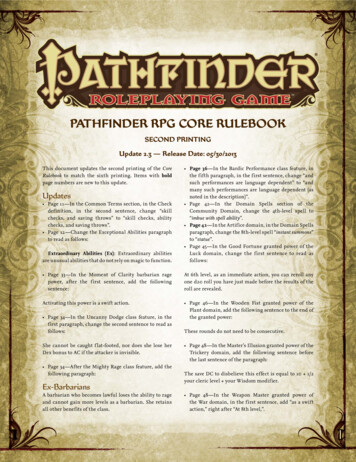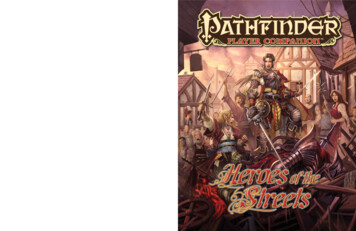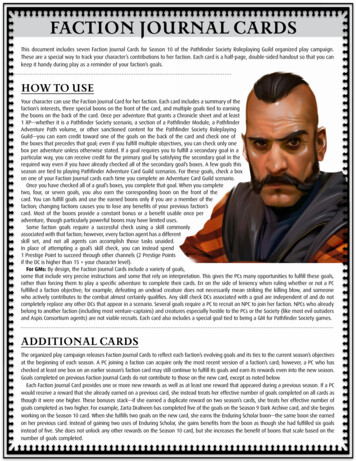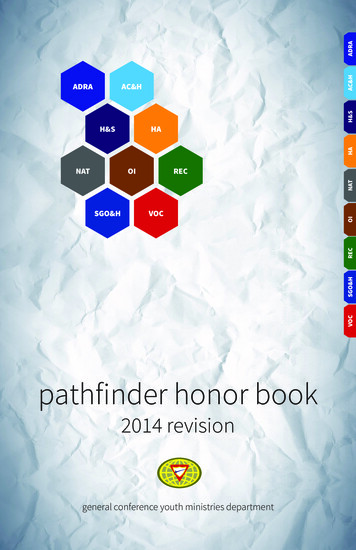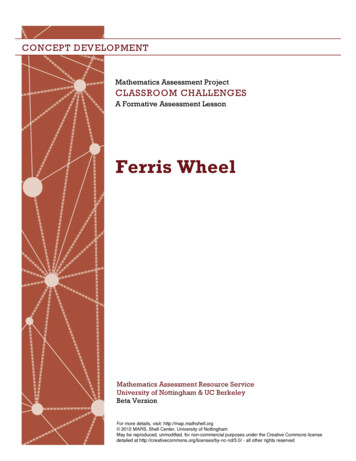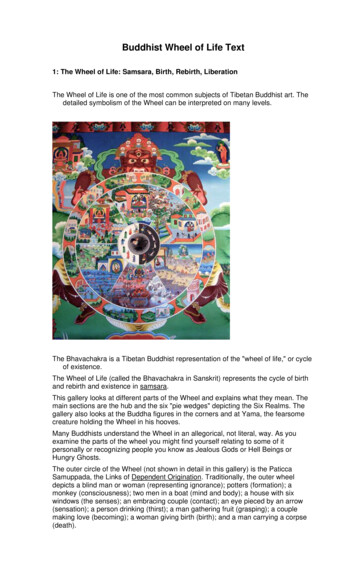
Transcription
Wheel of Time Pathfinder RPGIntroduction . 2Chapter 1 - Basics . 3Chapter 2 - Character Statistics . 4Chapter 7 - Feats . 72Feat Descriptions . 77Chapter 8 - Equipment . 85Economy . 85Weapons . 85Armor . 87Items . 87Special and Superior Items . 87Item Descriptions . 88Ability Scores. 4Stat Descriptions . 4Determining Stats . 6Improving Abilities . 7Chapter 3 - Races & Cultures . 8Choosing a Background. 8Human Characteristics . 9Ogier Characteristics . 10Traits . 12Chapter 9 - Channeling . 91Using the One Power . 91Embracing the True Source. 91Casting the Weave . 91Distractions . 94Overchanneling . 95Unlacing Weaves . 95Linking . 96Men and Channeling . 96Saidin and Madness . 97Weave Descriptions . 99Weave List. 100Talents and Weaves . 101Chapter 4 - Base Classes . 15Levels and Character Advancement . 15Favored Class . 15Level-dependant Benefits . 16Class Features . 16Character Creation Guide . 17The Armsman: Fighter . 18The Commander: Warlord . 20The Initiate . 23The Wanderer: Rogue . 26The Wilder. 28The Woodsman: Ranger . 32Multiclassing . 36NPC Classes . 37Balefire . 101Cloud Dancing . 101Conjunction . 103Earth Singing . 106Elementalism. 108Healing . 115Illusion . 118Travelling . 120Warding. 122Chapter 5 - Archetypes . 38The Armsman: Algai'd'siswai . 38The Armsman: Blademaster . 39The Armsman: Warder. 41The Armsman: Whitecloak. 41The Commander: Defender . 42The Commander: Great Captain . 43The Commander: Scout Captain . 43The Initiate: Aes Sedai . 44The Initiate: Asha'man . 46The Initiate: Windfinder . 47The Initiate: Wise One . 48The Wanderer: Gleeman. 49The Wanderer: Scholar . 53The Wanderer: Thief-taker . 54The Wilder: Kinswoman . 55The Wilder: Wisdom . 56The Woodsman: Blight Scout . 57The Woodsman: Wolfbrother . 58Chapter 10 - Monsters . 129Statistics Block . 129Monster Types . 130Monster List . 131Corlm. 131Darkhound . 132Darkhound, Greater . 132Draghkar. 133Gholam. 134Gray Man . 135Grolm . 136Lopar . 137Myrddraal . 138Raken . 140Shadow-Linked Rat. 140Shadow-Linked Raven (or Crow) . 141S'redit . 141To'raken . 142Torm. 143Trolloc . 144Wolf . 145Chapter 6 - Skills. 61Skill Descriptions . 621
IntroductionINTRODUCTIONthese guidelines to experience one of my favorite worldsThis work has its genesis in the fact that I get boredin exciting and unique ways.very, very easily. In such a state, my mind has a tendencyto wander to things like "could I adapt the outdatedHowever, the point of this document is to focus onWheel of Time d20 rules to the Pathfinder system?" Ithe mechanics of the system and how to implement storydecided the answer was "probably" and this is the result.ideas as faithfully as possible into a game system. ThereOriginally written by Robert Jordan (the pen name ofare whole reams of information available for thoseJames Oliver Rigney, Jr., 1948-2007), the Wheel of Time interested in the background and setting and I encourageis a series of (currently) 14 fantasy novels that tell theyou to visit them. For general information, you might trystory of a world that is both the precursor to andthe Wheel of Time Wiki (http://wot.wikia.com), whileancestor of our own, locked in a cyclical struggle with themore specific or in-depth inquires might benefit from theultimate enemy, the Dark One: Shaitan. It's rich historyWheel of Time FAQ (http://wotfaq.dragonmount.com/).covers thousands of years in staggering depth, while itsAnd, of course, I cannot highly enough that you readnarrative takes the reader through dozens of well-the books. They are not required to take advantage ofrealized locations, introducing vibrant cultures andthe rules presented here, but it is my belief that they willinteresting characters with so much detail that theenhance both your play experience and your enjoymentsetting simply begs to be further explored.of the game to a great degree.Essentially, Mr. Jordan provided the setting and I amIn 2001, the chance for just such explorations camein the form of The Wheel of Time Roleplaying Game,providing the rules. The imagination is up to you.produced by Dungeons & Dragons publisher Wizards ofthe Coast using their revolutionary d20 gaming system.Truly!,Introducing rules for the story's unique "Channeling" andadapting the systems' character creation and levelingJesse Jack Jonesmechanics for a world with both subtle and extreme02-17-2011differences from standard D&D, it allowed players toenter a world of vicious darkfriends, mysterious ortunately,thed20thoughsystemisacknowledged for having many faults that have beenrepaired by new editions over the intervening decade.The current standard bearer is the Pathfinder system,produced by Redmond, WA-based Paizo Publishing.Using the original d20 Wheel of Time RoleplayingGame as a base, I have attempted to create a Pathfindercompatible system that takes the best of the originalgame's revolutionary elements and melds them with thelessons learned by thousands of players over elevenyears of tabletop gaming. It is my hope that you can use2
Chapter 1 - BasicsCHAPTER 1 - BASICSA working knowledge of the Pathfinder gamingd12, and d20) for each player;system will be immeasurably helpful at understanding3.Paper (for character sheets, notes, etc).;the rules and concepts outlined in the rest of this4.Writing utensils (pencils or mechanical pencils workbest);document. I am designing this system as a personal5.project without need or desire for compensation of anysort and all relevant copyrights are held by PaizoA mat or some other grid with squares or hexes ofapproximately 1 inch (for combat maps);Publishing (for the system basics) and Robert Jordan's6.Miniatures or markers (to show characters andenemies on the combat map).estate (for the setting). Anything that does not fall underone of these two ownerships is my own personal,intellectual property.The group of players is divided into two roles:Feel free to distribute theinformation presented here, but I ask that no part of thisdocument be changed for purposes of redistribution by aThe Game Master—Also known as the GM, this is thethird party. Comments and criticisms are welcomed.individual in charge of running the game.TheyI consider it necessary that interested parties keepdesign the locales through which players travel,on hand at least one copy of the Pathfinder Corecreate the enemies the players fight, and speak forRulebook. The majority of the character creation rulesthe NPCs (Non-Player Characters) that the groupare derived from this source and there are manymeets. Qualities helpful to a GM are organizationallocations—especially in the chapters concerning skillsskills, knowledge of the setting, gaming experience,and feats—where the reader will be directed to theand the ability to adapt quickly to new situations.Pathfinder material in lieu of my repeating theinformation. I will also not be repeating rules governingThe Players—The rest of the group are the players. Eachcombat, which can be found in their entirety in theis responsible for a single PC (Player Character),Pathfinder core rules. If you find yourself confused bytaking on the role of that character and interactingany rules I give here-in concerning character creation,with each other and the environments and obstacleslooking at the relevant sections in the Core Rulebook maycreated by the GM. The single most important thingprovide clarification, as many of these rules draw heavilyfor a player to remember is that this is a game. Thefrom this source where they are not simply identical.goal is to enjoy yourself, to have fun with yourAdditionally, you can consult the d20 Pathfinder friends.System Resource Documents, available for free online athttp://www.d20pfsrd.com. Bear in mind, however, thatThe rest of this guide is broken into sections that willmany aspects of the system have been changed to allowdetail the various aspects of creating a character, fromthe game to better capture the feel of the Wheel ofselecting their race and background to choosing theirTime setting.class, assigning skills and feats, and outfitting theTo play, I suggest the following:1.A group of three or more people;2.One complete set of polyhedral dice (d4, d6, d8, d10,character with their gear.3
Chapter 2 - Character StatisticsCHAPTER 2 - CHARACTER STATISTICSexclusively the realm of PCs or powerful NPCs.Characters are governed by six attributes or statisticsBut what do these numbers mean? What is the(or simply 'stats"), which fall into two general groups: themechanical difference between a Strength of 16 and onephysical and the mental.of 18?Physical stats are Strength (raw, muscular power),Essentially, since the game system hinges on theseDexterity (agility and precision), and Constitution(endurance and health).six scores, they apply bonuses or penalties to prettyThese stats have the mostimmediate effect on combat, governing how muchmuch everything your character does.The bonus ordamage you can inflict, how well you can dodge, andpenalty takes the form of a positive or negative numberhow much damage you can take.that is factored into every calculation involving thatMental stats are Intelligence (your memory andstatistic (such as skill checks, attacks, saving throwsreasoning ability), Wisdom (your common sense andagainst various effects, etc)., the details of which will bewillpower), and Charisma (your charm and the force ofdiscussed later.your personality). These stats have the most immediateUsing 10 as a baseline, the higher above that aeffect on social situations and your special abilities,statistic is, the greater its bonus (a 1 bonus for every 2governing your skill mastery, mental strength, and yourpoints above 10), while the lower it is than 10, theability to Channel.greater the penalty (a -1 for every 2 points below 10).See Table 2-1 for details.Whenever something says to add the Ability BonusAbility Scores(i.e., Strength Bonus, Constitution Bonus, etc)., you canA human's statistics almost always fall into a rangerefer to this chart (or continue the progression, if youfrom 3 to 18, the average being a score of 10 or 11. Thishave a statistic greater than 21) for the relevant bonus ormeans that your typical peasant will most likely have allpenalty.10's for their statistics, with the possibility of a 12 or 13Stat Descriptionsin one, usually with a corresponding 8 or 9 in another.There may be outstanding normal individuals—like thevillage strongman, with a Strength of 14 or even 16—butBelow are more detailed descriptions of what eacha normal human with a score of 17 or 18 in any stat isstatistic represents and a list of some of the aspects ofalmost unheard of. A score of 18 is the absolute limit forplay the statistic will influence.the normal human.Just reaching it requires specialcomprehensive with the lists, but it is still a good idea totraining (such as the rigorous physical training ancheck the relevant section of the document to figure outOlympic athlete in our world might undergo) or somewhich statistic to use where.I have tried to besort of unnatural augmentation. Stats higher than 18 areTable 2-1: Ability Score ModifiersAbility nus-5-4-3-2-10 1 2 3 4 54
performing physically stressful acts such as swimming orStrength (Str)marching longer, while a low constitution is moreRaw, physical power, strength is a measure of yoursusceptible to poisons and illness.muscles and how well you use them. A high strengthConstitution has a direct, bonus-based effect on theenables you to lift and carry more weight, hit harder, andfollowing abilities:grapple more effectively. A low strength score means itis easier for foes to restrain you and that you will have aharder time striking in melee combat, as well as do less Hit pointsdamage. Fatigue Fortitude saving throwsStrength has a direct, bonus-based effect on thefollowing abilities:Intelligence (Int) To-hit chances in melee combat Damage with melee and thrown weaponsgoverned by intelligence. Combat Modifier Bonusintelligence can master multiple skills more easily, while Combat Modifier Defenseone with a low intelligence will find themselves Lifting and carrying capacitieschallenged by academic pursuits and feats of mental Forcing open or breaking inanimate objectsprowess. Strength-based skillsReasoning ability, knowledge, and memory are allA character with a highIntelligence has a direct, bonus-based effect on thefollowing abilities:Dexterity (Dex)It Skill Pointsaffects your agility, grace, and precision. A high dexterity Bonus dialects and languagesallows a you to sneak and hide well, to open locks, or Channeling (for Initiates)make ranged attacks. A low dexterity, meanwhile, makes Intelligence-based skillsStealth and speed are governed by Dexterity.one clumsy and easier to hit in combat.Dexterity has a direct, bonus-based effect on theWisdom (Wis)following abilities:A measure of the perceptions and common sense acharacter has and the strength of their will power. A Defensecharacter with a high wisdom can endure torture or To-hit chances in ranged combatresist special attacks that affect the mind. Low wisdom, Combat Modifier Defensemeanwhile, dulls the senses and makes them easier to Reflex saving throwssurprise. Initiative Dexterity-based skillsWisdom has a direct, bonus-based effect on thefollowing abilities: Channeling (for both Initiates and Wilders)A character's toughness and overall health are Will saving throwsmeasured by their constitution. A character with a high Wisdom-based skillsConstitution (Con)constitution can take a lot of punishment or continue5
On the other hand, perhaps you wish to have aCharisma (Cha)character skilled in Channeling and so distribute yourPhysical beauty and the sheer power of a character'sskills as such:personality both fall under the measure of Charisma. It ispossible, of course, to have one without the other—to bevapid but beautiful, or persuasive but hideous.Strength 8Acharacter with a high charisma is persuasive andDexterity 12diplomatic, while a low charisma lends itself to weakerConstitution 10powers.Intelligence 10Wisdom 13Charisma has a direct, bonus-based effect on thefollowing abilities:Charisma 14 Channeling (for Wilders)Player characters, however, generally have at least Charisma-based skillsslightly greater abilities than the average citizen.Because of this, there are other, alternate ways ofdetermining statistics that generally guarantee a higherDetermining Statsoverall set of scores. I list three ways here:The simplest and most traditional method ofdetermining a character's ability scores is to roll 3d61) Lowest Score Method: What you do in this instance(three six-sided die) and add the totals together. Youis that, instead of rolling six sets of 3d6, you rollwould do this six times, arriving at six numbers rangingseven. Then, you drop the lowest single score andfrom 3 to 18. Then, each of these would be applied toplace the remaining six where you want.one of the six stats (sometimes in the order they wereinstance, if you roll these seven scores—11, 11, 8, 9,rolled, more commonly by assigning them where you16, 8, and 14—you would drop one of the 8's andwish).place the remaining six scores where you wish.ForFor example, let's say you roll 3d6 6 times and endDepending on the power level you want in theup with the following numbers: 10, 10, 8, 13, 12, and 14.campaign, you can add additional rolls (i.e., roll 8You would then assign each one of these numbers to onesets, drop the lowest two, roll 9 sets, drop theof the six stats.lowest three, etc). to ensure stronger PCs.The higher the number, the morecapable one is with the stat. You might want a character2) Lowest Roll Method: In this case, you would roll sixwho is a powerhouse in battle, so you would distributesets of 4d6 and drop the lowest single die roll in eachyour skills in this fashion:set. For instance, you might roll 4d6 and get theStrength 14following four numbers—2, 4, 3, and 4—you wouldDexterity 12then drop the 2 and end up with an 11. You do thisConstitution 13six times to get the six numbers you assign to theIntelligence 8ability scores. Depending on the power level youWisdom 10want in the campaign, you can add additional dieCharisma 10(i.e., roll 5d6, drop the lowest two die, roll 6d6, dropthe lowest three die, etc).6or combine with the
Lowest Score Method (i.e., roll 4d6 seven times, Leveling up:As the character advances in leveldrop the lowest die from each set and then drop the(more on this in the next chapter), they willlowest set) to ensure stronger PCs.automatically be able to improve any of their sixthththstats they so choose. Every 4 levels (4 , 8 , 12 ,3) Point Allocation Method: This method leaves theetc)., they will get 1 bonus point to add to any stat ofleast to chance. Each character starts with a 0 intheir choosing.each statistic and a pool of points that they can drawfrom to increase each ability score. The number of Destiny Feats: Characters gain access to feats (morepoints can vary depending on the power level of theon this in Chapter 5), which allow them to customizecampaign, though an average-power campaigntheir characters heavily. Amongst the various featswould have a starting pool of about 75 points. Inthey are allowed to pursue, there are certain trainingsuch a case, you could end up with the followingfeats which allow them to improve their abilityscores: 10, 10, 12, 12, 14, and 17. This method alsoscores.has the benefit of putting all the PCs on a levelplaying field with one another—one PC won't Special Abilities: Using certain special abilities, onedominate the party by virtue of few lucky rolls, orcan temporarily enhance their ability scores (orend up with a useless character because of a fewreduce the ability scores of opponents).bad ones. Improving AbilitiesItems:There are also certain items that cantemporarily increase ability scores. There are tconfer ability score increases for as long as that itemOne of the points of the game is that characters areis worn or used.supposed to grow and evolve. It would be difficult to dothis if ability scores—the fundamental underpinning ofthe character—were static through the course of thegame. To that end, there are several ways of improvingability scores, both temporarily and permanently. Themost common include:7
Chapter3 - 3Races& CulturesCHAPTER- RACES& CULTURESHuman characters have a dozen backgrounds toThe fields and forests of Andor are home to proudchoose from:and upstanding peasants and townsfolk who live theirlives simply, without affectation or indulgence.TheAiel: A fierce, semi-nomadic desert people who valueresidents of Arad Doman, on the other hand, are knownthroughout the land for their sensual natures andhonor above all else.Benefits: 2 Constitution,scandalously revealing clothing. Someone who lives in aForged by the Three-Fold Land: Does not suffer fromlarge, humid southern coastal city, such as Ebou Dar orconditions that would make a character fatigued.Illian, looks, acts, and talks differently from a tall, sternConditions that would make an Aiel exhaustednorthern person. And of course a giant Ogier or a desertinstead make them fatigued.warrior of the Aiel sticks out like a sore thumb anywhereAtha'an Miere (Sea Folk): A dark-skinned seafaringin the westlands (the lands west of the mountains of thepeople who ply exotic seas in the most powerfulSpine of the World).ships the world over. Benefits: 2 Dexterity, PeopleThough all these people are human (except theof the Sea: 6 to all Con checks made to hold yourOgier, naturally), where they come from influences whatbreath underwater, 6 to all Swim checks made tothey're like, how they think and act, and the way theyresist nonlethal damage from exhaustion, 6 to alldevelop as they grow. A child raised in Shienar typicallyFortitude saves made to resist damage frombecomes a very different sort of adult than one raisedsuffocation.Borderlander: Tough warrior folk from the kingdoms thatfrom Tarabon, Tear, or Cairhien. In the Wheel of Time setting, you reflect these sorts of differences by choosingborder the Blight.Benefits: 2 Constitution,a background for your character.Continue the Fight: Reroll Fortitude save once perday.Cairhienin: A nation founded on order and driven by theChoosing a Backgroundsubtleties of the Great Game of Houses. Benefits: 2Intelligence, Playing the Game: Reroll Wis-based skill"Background" is a broad term, generally referring tocheck once per day.the region or culture from which your character arises. ADomani: A sensuous and exotic people famed for theircharacter can only have one homeland, so you cannotenjoy the background benefits of both the midlands andfiercetempers,cunninginnegotiation,andnearby Tear, even if you decide that your character wasinscrutable ways. Benefits: 2 Charisma, The Art ofraised in a peddler family and traveled throughout bothSeduction: Reroll Cha-based skill check once per day.areas as a child. You must choose the one that best fitsEbou Dari: A passionate people famed for settling allmanner of offense with the dueling knife. Benefits:your concept of your character. 2 Dexterity, Beware the Knife: Force enemy to rerollAs you think about your background, you'll probablyattack once per day.want to consider the class and archetype you have inmind, as some backgrounds lend themselves to aIllianer: The people of a powerful seafaring nation thatparticular role more than others. Aiel, for example, canvalues justice and stability. Benefits: 2 Wisdom,be wanderers, but their homeland and upbringing makeThus Always to Tyrants: Once per day add Wisthem better suited to being algai'd'siswai.modifier to attack roll, character level to damage roll8
descriptions of backgrounds apply only to the majority ofon melee attack against foe.Midlander: The sturdy, stalwart folk of the centralpeople. In each background, some individuals divergeregions of the westlands, known for their practicalfrom the norm and your character could be one of these.outlook on life and modest country ways. Benefits:Don't let a specific background keep you from detailing 2 Wisdom, Wool-Headed: Reroll Will save once peryour character as you like.Table 3-1 lists all the backgrounds available today.Seanchan: Stern, mysterious, and deadly strangers fromhuman characters, describing dialects, bonus backgrounda distant land thousands of leagues beyond thetraits, and skill bonuses. For more detail about individualBenefits: 2 Constitution, Battle-countries and their behaviors, you can consult the Wheelwestern ocean.of Time books or pay a visit to the Wheel of Time WikiReady: Reroll Reflex save once per day.Tairen: A powerful nation renowned for its horses, theat http://wot.wikia.comabsolute grip of its nobles over the people, and itsHuman Characteristicstendency to war upon its neighbors. Benefits: 2Dexterity, Glory and Conquest: 4 bonus to all criticalhit confirmation rolls.As a human, your character is Medium-size, and hisTar Valoner: Citizens of the most beautiful, civilized, andor her base speed is 30 feet. This is true of all humanlearned city in the world, who live under the ever-characters (though the latter can be altered by feats andpresent shadow of the White Tower. Benefits: 2class abilities).Intelligence, If I Recall Correctly: Reroll Int-based skillYour character's background determines some of hischeck once per day.or her qualities, including special traits unique to thatTaraboner: A people torn by civil strife but justly proudbackground, skill bonuses, and what dialect of the Newof a heritage and learning that dates back to the AgeTongue he or she speaks.of Legends. Benefits: 2 Intelligence, How We Did Itin the Old Days: Once per day take 10 on any skillBackground Benefits: The second column on Table 3-1even if circumstances would not normally allow it.lists the benefits unique to each background.Unaffiliated: You are either an atypical example of yourRegional Traits: The third column contains several traitsgroup or perhaps you come from one of the ever-for each background.expanding areas of wilderness marring the map.represent the common sorts of talents people fromBenefits: 2 to any stat except Strength, All Aroundthat region learn. Choose two of them for yourthe World: Upon character creation, select onecharacter. Bear in mind that some traits can beadditional trait from any background.selected more than once.These special abilitiesBackground Skills: The next column gives several skills forAlternately, you can choose to play an Ogier.each background.These are skills commonlyInformation on Ogier appears after the section on humanacquired by people from that background. Selectcharacteristics.one skill for your character. You gain 1 rank in thisYou character's background gives you plenty of cuesskill and it becomes a class skills for your character,as to what sort of person he or she is, how he or she feelsregardless of which class you choose for yourabout characters of other backgrounds, and what mightcharacter.motivate him or her. Remember, however,
Feb 17, 2011 · Wheel of Time d20 rules to the Pathfinder system?" I decided the answer was "probably" and this is the result. Originally written by Robert Jordan (the pen name of James Oliver Rigney, Jr., 1948-2007), the . Wheel of Time is a series of (currently) 14 fantasy novels that tell the story of a world that is both the precursor to andFile Size: 1MBPage Count: 145
